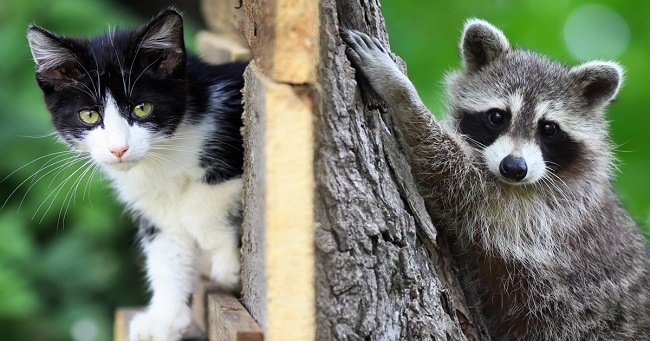The common raccoon, an animal known for its adaptability and insatiable curiosity, often raises many questions due to its varied diet and bold behavior. Among these is the alarming query: do raccoons eat cats?
To provide a comprehensive answer, this article explores raccoon behavior, their relationship with cats, and how to ensure the safety of your feline friend.

Raccoon Behavior: Opportunistic Omnivores
Raccoons are omnivores, meaning they consume a diverse range of food including fruits, plants, insects, and smaller animals. Their choice of food largely depends on what is easily available in their environment.
Read Also:
Their diet can indeed include meat, but their usual prey consists of creatures easier to catch and consume, such as fish and small mammals.
Do Raccoons Eat Cats: Fact or Myth?
Raccoons and cats occasionally cross paths since both are nocturnal and are often found in similar urban and suburban environments. However, the notion that raccoons routinely prey on cats is largely a myth.
While raccoons are capable of attacking a cat if they feel threatened or cornered, they do not hunt cats for food.
Instances of raccoons attacking cats are relatively rare and often occur when the raccoon is protecting its young or competing for food. In most cases, raccoons and cats will avoid each other, with cats typically steering clear of these larger, unknown creatures.
Protecting Your Cats from Raccoons
Understanding the dynamics between raccoons and cats is key to ensuring your pet’s safety. Here are some practical tips:
Keep Food and Water Indoors: Leaving food and water outside can attract raccoons, increasing the chance of encounters with your cat.
Secure Pet Doors: Raccoons are intelligent and can figure out pet doors. Consider locking these at night or installing electronic doors that respond to your cat’s microchip or collar.
Vaccinate Your Pets: Raccoons can carry diseases like rabies which are dangerous to pets. Keeping your cats vaccinated provides an important layer of protection.
Provide a Safe Shelter: Ensure your cat has a safe, elevated place to escape to, should a raccoon venture into your yard.
Avoid Leaving Cats Outside at Night: Raccoons are nocturnal. Keeping your cats indoors at night significantly reduces the risk of encounters.
Raccoon Characteristics: A Key to Understanding Their Behavior
Raccoons are extremely adaptable creatures, known for their dexterity and intelligence. They have five-toed paws that they use almost like hands, enabling them to open containers and even doorknobs. This contributes to their reputation as pests, as they can cause havoc in search of food.
Raccoons are typically 2 to 3 feet long and can weigh between 10 to 20 pounds, although urban raccoons can grow significantly larger due to abundant food sources. Their larger size compared to cats can make them intimidating, although they usually prefer to escape rather than fight.
Raccoons and Disease: The Hidden Risk
Beyond direct attacks, raccoons can pose a risk to cats due to the diseases they carry. The most well-known of these is rabies.
While a rabid raccoon can become aggressive and attack a cat, the disease can also be transmitted indirectly, such as when a cat comes into contact with the urine or feces of an infected raccoon.
Other diseases that raccoons carry include leptospirosis, a bacterial disease, and a variety of parasites like fleas and ticks. To keep your pets safe, ensure they are up to date on all vaccinations and treatments for parasites.
The Impact of Human Intervention
Human behavior can inadvertently affect the relationship between raccoons and cats. The more humans leave out accessible food, the more likely raccoons are to inhabit those areas.
This increases the chance of raccoons coming into contact with domestic animals, including cats. To reduce potential interactions between raccoons and pets, secure garbage cans with tight-fitting, locking lids and avoid leaving pet food outdoors.
Keeping the surroundings clean and free of potential food sources can significantly discourage raccoons from visiting.
Raccoon Repellents: Aiding in Cat Safety
If raccoons frequent your area, consider using raccoon repellents. These can be in the form of sprays, granules, or even electronic devices that use light or sound to deter raccoons.
Repellents can add an extra layer of protection, discouraging raccoons from entering your property and thereby reducing the risk to your pets.
Keep in mind, however, that the effectiveness of repellents can vary, and they should be used in conjunction with other preventative measures, not as a sole solution. Always remember to ensure that any repellent used is safe for all of your pets.
By understanding raccoons and their behavior better, we can make informed decisions to protect our pets and allow for harmonious cohabitation with the wildlife in our surroundings.
Read Also:
Conclusion
While raccoons are opportunistic omnivores, the fear that they prey on cats is mostly unfounded. Encounters between raccoons and cats can occur, but they rarely result in the raccoon eating the cat.
Nevertheless, it’s important to take precautions to minimize any potential risk and ensure the safety of your feline friend.
Understanding the dynamics between raccoons and cats allows for coexistence in shared environments, while also maintaining the well-being of your beloved pets.
























